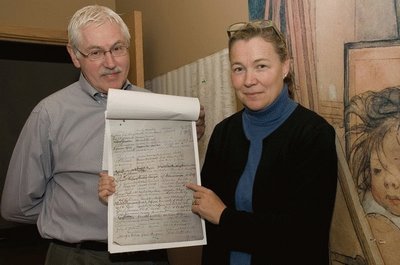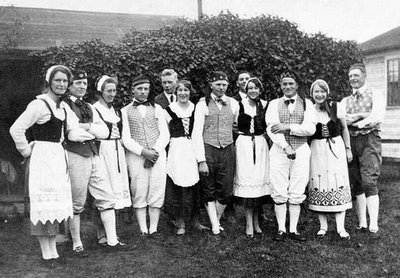November 6, 2008
By popular demand: Department of Scandinavian Studies celebrates its centennial
The UW’s Department of Scandinavian Languages and Literature was created in 1909 in response to community demand. As the department — bigger, broader and now named Scandinavian Studies — begins to celebrate its centennial, that community connection remains strong.
So strong, in fact, that seating reservations for The Power of Scandinavia, a Nov. 12 lecture by faculty member Christine Ingebritsen, filled quickly. Walk-ins for the lecture, part of this year’s Centennial Series: Beyond the American Point of View, will be taken on a space-available basis.
It’s the first of several centennial-related events, honoring a unit that has evolved over the decades to become what Terje Leiren, department chair, described as “Not just a languages and literature department — we are a miniature liberal arts college that focuses on Scandinavia,” and Baltic countries, too.
Terje said as the department continues to grow and flourish at and past its centennial, it seeks to become “the face of Scandinavia and the Baltic countries in American academia.”
Interest in a department to study Scandinavian issues got its start on the UW campus in 1908, according to an excellent history available online. There were only 1,600 students at the UW when two petitions were circulated that requested the teaching of Scandinavian languages. One was signed by 25 students; the other by hundreds of community members. Both groups lobbied the Washington State Legislature, which passed a bill ordering such a department, along with a program in Military Science, and they remain the only two university departments in the state established by an act of the Legislature. The new law went into effect in March, 1909.
About 500 people attended a gala reception and banquet in 1910 to celebrate the department’s birth and to honor its first professor, David Nyvall. In 1912, however, Nyvall left and Edwin J. Vickner took over as the one-person faculty; Vickner oversaw much expansion and led the department until his retirement in 1948. It was in 1948, too, that the department began offering master’s degrees, and doctoral degrees were approved in 1967.
The 1960s and 1970s saw continued growth in the department, according to the history, with increasing enrollment and faculty numbers. The curriculum grew more broad in 1982 when a major in Scandinavian Area Studies was approved. The teaching of Scandinavian politics soon followed.
The department embraced Finnish studies in 1990, the history states, by adding it as a minor. “Within a few years, Finnish Studies had reached a curriculum status equal to that of other areas of study in the department.” A visiting lectureship agreement was forged with the Finnish Ministry of Education in 1995, which led to a series of visiting lecturers in Finnish studies. A similar connection came in 1997 with the Danish Ministry of Education, leading to a visiting lectureship in Danish.
The department branched into the teaching of languages of Baltic countries — Estonia, Latvia, Lithuania — with a summer institute in 1993 followed by the creation of its Baltic Studies Program in 1995. Other additions came over subsequent years: endowed professorships in Baltic Studies and Lithuanian Studies, a Latvian visiting lectureship and endowed professorships in both Swedish and Norwegian studies.
Leiren said the move toward area studies over just languages and literature dates back to the late 1970s, though it was not until 1996 that the department formally changed its name to Scandinavian Studies. The evolution was partly driven by the need for more students and a higher profile, he said. “A course in Danish language is not going to be high enrollment, but on Vikings and Hans Christian Anderson, or on politics or environmentalism — these kinds of courses have a great appeal to students these days.”
It’s also in keeping with a more holistic approach to studying a country — “a broadening of the whole concept of why we study a particular region.” Leiren said area studies is now more the rule than the exception, to the benefit of students. “It’s standard practice now. And I think in a way we saw that demand, that need, pretty early. Now we have no problem placing our people when they graduate.”
At its 100-year mark the Department of Scandinavian Studies maintains a close relationship with the outside community that helped give it birth. “We were the first department in the college [of Arts & Sciences] to have a community advisory board,” notes Leiren. “We started it in 1984, at our 75th birthday.” That connection has proved greatly helpful in fundraising and departmental development, Leiren said. “It’s gotten us two chairs and two professorships — it’s been very successful.”
A century later, the original petitions that got Scandinavian Studies started are hanging on the walls of the department’s Raitt Hall home.
Planned Scandinavian Studies centennial-related events:
- Ingebritsen will discuss the noteworthy contributions of Scandinavia to world politics and global society in her Nov. 12 lecture, The Power of Scandinavia. You can learn more about her talk and the lecture series, sponsored by the College of Arts & Sciences and the UW Alumni Association, at https://go.washington.edu/uwaa/events/2008as_centennial_series/details.tcl.
- The department plans to hold an alumni reunion in September of 2009, and to combine that with a Baltic and Scandinavian Oak tree planting in the grove area between Parrington Hall and the Law School.
- An event is planned for March 2009 in Olympia involving several legislators of Scandinavian heritage, to mark the actual centennial day.
- In September of 2009, the national organizations of Norwegian Studies and Swedish Studies will hold their annual meetings on the UW campus.
- The department will host three national conferences as part of the centennial celebrations, including the annual meeting of the Society for the Advancement of Scandinavian Study — also celebrating its 100th year — in April 2010.
- Talks also are under way to arrange a visit to Seattle by members of one of the royal families of Scandinavia to conclude the centennial celebration.




